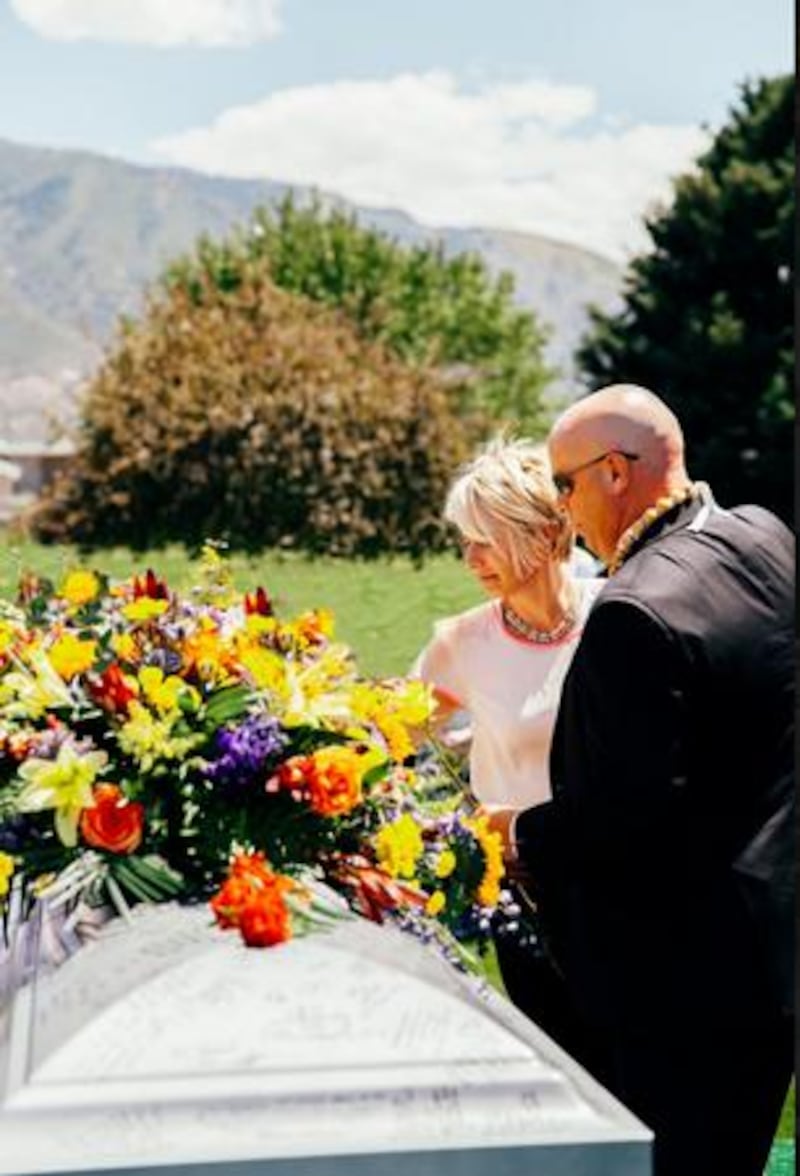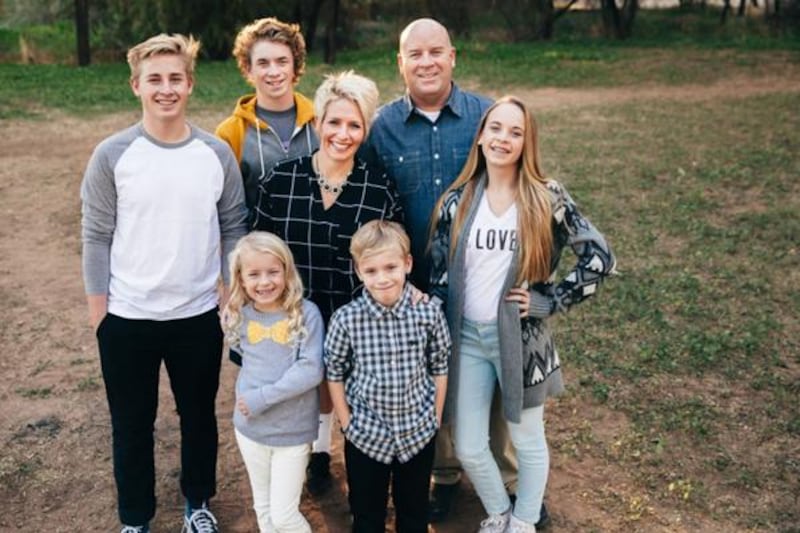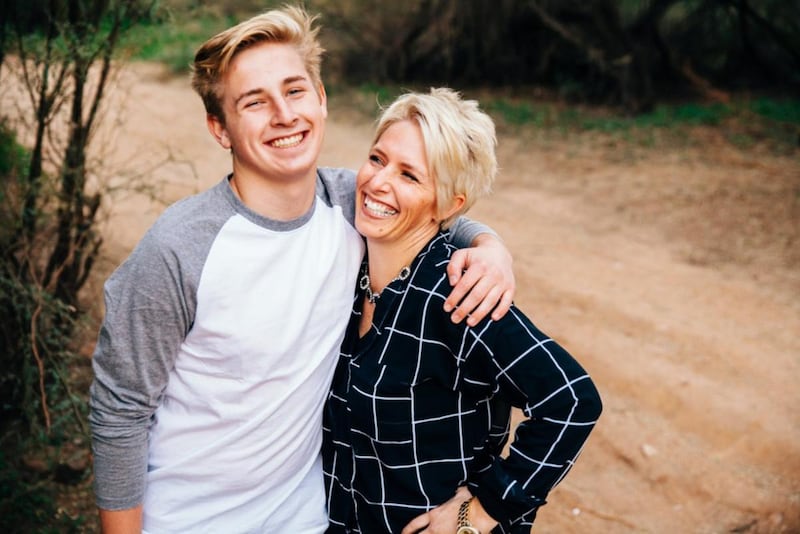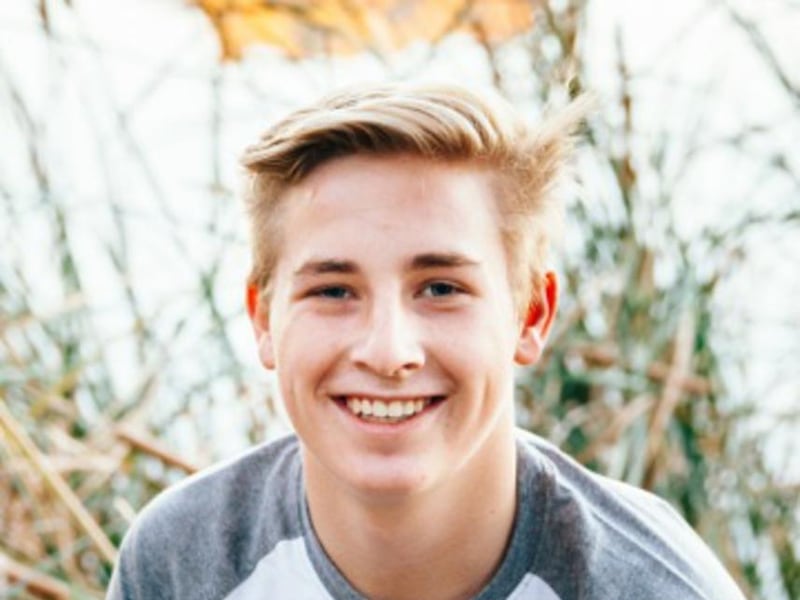There was a moment sitting in the hospital that has carried Heidi Swapp in the 21 months since her 16-year-old son, Cory, took his own life.
Cory’s body lay seemingly lifeless. But because his organs were being donated, his body was being kept alive as donor criteria was prepared. His heart was still beating, his lungs were still working and his skin was warm. But Swapp, a member of The Church of Jesus Christ of Latter-day Saints and CEO of a scrapbooking company, had a feeling that her son’s spirit was somewhere else.
“As the sun was coming up, I distinctly heard and felt the spirit tell me that a loving Heavenly Father had allowed Cory to come home,” Swapp remembers. “And that thought has carried me. I knew that a loving Heavenly Father knew what Cory was going through and that Cory was not alone, that he was not off wandering somewhere, that he was going home.
“He was going home and he was being received there by people that knew him and love him. And that every ounce of care that he would need, he would be given and from that moment, I knew that we were being supported fully by heaven.”
In the days that followed his death, Cory Swapp was remembered by his mother in a blog post as having an “infectious personality, genuine sense of humor and bigger-than-life smile.” A rugby player with an affinity for animal T-shirts, Cory Swapp had a girlfriend, a car and had just purchased a new skateboard.
“Even now when I look back at pictures, I think that still is what makes me feel the saddest,” Heidi Swapp said. “He’s just not someone who you would’ve thought would make that type of decision.”

His death brought many questions, most of which were impossible to answer.
“We are heartbroken by his passing and hope someday to understand the hopelessness and silent evils that inflict a child’s spirit,” his obituary read.
Swapp, who began teaching scrapbooking classes when she was pregnant with Cory, says that while she still doesn’t know what ultimately caused her son to take his life, she has been given bits of clarity.
“Hindsight is 20/20 and I feel like I’ve learned a lot of things since he passed away and I’ve been able to kind of piece things together, certainly better than I did when it was going on."
Retrospect
Cory Swapp was the happiest his mom had ever seen him at the end of his eighth-grade year. He had recently become involved with Crossfit and developed a love for running. But one day, an accident on a pogo stick that was able to bounce six to seven feet in the air resulted in a serious concussion.
Cory's father, Eric, is a rugby coach who understands the seriousness of a brain injury and immediately pulled his son out of all athletic activities. Cory was put on brain rest and didn’t play rugby all summer or fall. It was difficult for Cory emotionally, according to his mother.
Heidi Swapp, who lives with her family in Herriman, Utah, says that after Cory's death, the organ donor team went over his medical history and told her that Cory likely suffered a serious brain injury.
During the first quarter of his ninth-grade year, just months after the pogo stick accident, Cory’s grades plummeted. Swapp said her initial reaction was to be mad at her son. But when his grades didn’t improve — despite the fact that she knew he was genuinely bothered by his performance — she realized there could be a serious problem.
Over the next year and a half, Eric and Heidi Swapp took Cory to the doctor and counseling, and sent him to a new school with a less-demanding curriculum. But according to his mother, Cory continued to spiral downward. He got in trouble with drugs, leading to a suspension from school for two quarters, during which time he completed assignments from home and had a 4.0 GPA while working a full-time job.

His success during this period of time, when he was working on his own, remained a mystery to his parents. But after Cory’s death, his little brother Connor, who was 7 when Cory died, began to say the type of things Cory once said: that he thought he was too stupid to live, that he wished he was smart, that he was embarrassed that other kids understood and he didn’t. Because of their experience with Cory, the Swapps made sure Connor was tested, and the doctor diagnosed him with dyslexia and processing disorder.
“There was a night-and-day change in Connor where he realized that something was wrong or something was different and that he could get help,” Heidi Swapp said.
A processing disorder would have made it difficult for Cory to perform well in a classroom environment. His parents knew something was wrong, but they were never able to pinpoint the issue. They wanted to help, but they also knew Cory didn’t want help.
Still, they had hope. When Swapp left a counseling session with her son in early July 2015, she sent a text message to her husband, who was coaching rugby in Canada.
“I think we’re going to be OK,” the text said.
Accepting your story
Just hours later, Heidi Swapp received a call from Cory’s girlfriend. She was hysterical and said Cory was going to commit suicide.
Having just been with her son, Swapp tried to reassure the girl. But 30 minutes away from home, she called Cory just to be sure. When he didn’t answer, she sent a text that said, “I need you to call me right now.”
He called, and in their last conversation on this earth, Cory made it clear that he loved his mom.
“He was just telling me how sorry he was and how much he loved me and I finally got him to tell me where he was and he told me that he was in the bathroom," she said. "I assumed it was in the house. The way he sounded I didn’t know if he had already hurt himself. I didn’t know what was going on and he just said, ‘I’m sorry and I love you,’ and then hung up and he wouldn’t pick up again.”
She immediately called the police, who came to the home. According to Heidi Swapp, the police told the family that they saw Cory look out the window. Shortly after, they heard a gunshot inside the house.
Swapp frantically drove home with 911 dispatch on the phone. She was rerouted to the hospital where Cory was taken.
“As I sat in the hospital, the realization that this is now my story settled in,” Swapp wrote on her blog shortly after Cory’s death. “I didn’t like this story at all. It’s not the story that I imagined for Cory, or for my family. However, I am a storyteller. I am a memory keeper, and I am a person who believes that good comes from even the worst situation, if you look for it.”

And with that, Swapp wrote about and shared photos of her son’s funeral, which included a white casket covered in notes from those who knew and loved Cory, and a garland made of Cory’s animal shirts. She wrote of a church leader who spoke at the funeral and said, “Cory’s not gone, he’s just gone ahead."
And then, Swapp wrote the feelings of her heart.
“My heart will never be the same,” she wrote. “I miss him. I love that kid so much. He didn’t want us to know how sad he was. I am constantly wishing I could have said or done something different. I thought we were making progress — I tried to understand.
“The fact is that depression is real. And it’s horrible. It’s mean and ugly. It distorts the truth and it can be so silent. It can be hidden behind beautiful smiles, handsome faces and disguised as normal ups and downs.”
In the months that followed, Swapp, whose Facebook page is followed by nearly 100,000 people, saw her transparency help others, and she was given an opportunity to share beliefs that she holds dear.
“As social media goes, I think people looked at my life and thought, ‘She’s got everything.’ … And I have this saying that I’ve always loved but have come to learn even more through all of this: ‘Through our strengths we compete with each other but through weaknesses, we connect with each other,’” Swapp said. “I was amazed by how much people needed to connect with this story and connect with the notion that you can keep going.”
Swapp has kept going. She has learned that “you don’t have to have all the answers to feel peace,” and she credits her “mother heart” for not allowing her to quit.
“I did feel guilty sometimes smiling, and I would look at a picture of myself and even when I was smiling, I knew how sad I was,” Swapp said. “But you know, there’s this part of my mom heart that I don’t want Cory to feel guilty for my giving up or not making the most (of life). I don’t want him to feel bad for stopping me from doing what I’m here to do. … I want Cory to be proud of me and to know that he has made me better and stronger.”
She believes that this experience really has made her stronger.

“One thing that I knew really, really early was that I felt this extreme added measure of compassion and empathy and patience for everybody because of this trial and I realized that because of going through this, it allowed me to become just a little bit more like my Savior. … Without going through hard things we can’t gain that empathy for others. And I consider that one of the gifts of this really horrible situation.”
This Friday, two days before Easter, Cory Swapp would’ve turned 18 years old. His family continues to rely on their faith that Cory is known by a living God who welcomed him home.
“I absolutely rely on the fact that I’m known to him, as is Cory, as is my whole family,” Swapp said. “And that there is a great purpose in this journey and that it’s not a mistake or a detour. I believe it is the path that will allow all of us to be the best version of ourselves through it and because of it.”
If you or someone you know have thoughts of suicide, call the suicide prevention hotline at 1-800-273-TALK.
Other hotlines:
- Utah County Crisis Line: 801-226-4433
Salt Lake County/UNI Crisis Line: 801-587-3000
Wasatch Mental Health Crisis Line: 801-373-7393
National Suicide Prevention Lifeline: 1-800-273-TALK (8255)
Trevor Project Hotline for LGBTQ teens: 1-866-488-7386
Online resources:
Utah Suicide Prevention Coalition: Utahsuicideprevention.org
NAMI Utah: namiut.org
Utah Chapter-American Foundation for Suicide Prevention: afsputah.com
Suicide Prevention Lifeline: www.suicidepreventionlifeline.org
Crisis counselors can also be reached using the SafeUT app on any smartphone.



